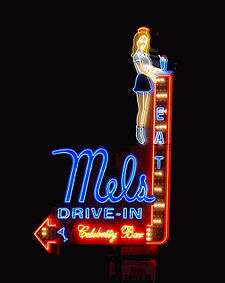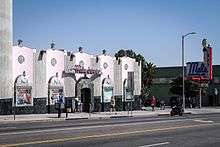Mel's Drive-In
Mel's Drive-In is an American restaurant chain founded in 1947 by Mel Weiss and Harold Dobbs in San Francisco, California. It is closely associated with the film American Graffiti.

Locations and naming
There are a number of Mel's in Northern California that share the same general American Graffiti nostalgia theme and the similarly styled Mel's logo. These restaurants are called “Original Mels”. Their locations are not listed on the official Mel's Drive-In website, although an article from the Sacramento Business Journal shows that they're related.
A family rift caused the Weisses to part ways and form two chains. The elder Weiss sold his company to Larry Spergel in 1994, who formed a group of about 50 stockholders that now owns the chain. The Walnut Creek, California, location features a history of the original San Francisco Mel's.[1]
Some Mel's Drive-In locations are not actually drive-ins, but rather diners. For example, while founded in San Francisco, none of the locations in the city currently serve food to patrons’ cars.

Signage and menus on the original Mel's Diners did not have a possessive apostrophe in the name, as would be expected. However, when Universal Studios recreated the diners at their theme parks in Hollywood, Orlando, Japan, and Singapore, they opted to include the apostrophe in all Mel's Drive-In signage, literature, and media.
One location near downtown San Francisco, rechristened Mel's Kitchen, has gone upscale, serving $12 cocktails, $16 burgers with locally sourced beef, ahi poke, acai smoothies, and avocado toast. [2][3][4][5] That site was almost demolished to build housing.[6]
Protest
In October 1963, the Mel's Drive-In chain was picketed and subjected to a sit-in by the Ad Hoc Committee to End Discrimination over the fact that while the restaurant would serve food to African Americans and hired them as cooks, they were not allowed to work “up front” where they could be seen by white customers. More than 100 protesters were arrested. The picketing ended when Harold Dobbs, a San Francisco City supervisor who had run for mayor and lost, settled with the protesters and began to allow black workers up front. [7]
In popular culture
In 1972, the restaurant was selected as a feature location by George Lucas for his 1973 film American Graffiti. The Mel's used was located at 140 South Van Ness Avenue in San Francisco.[8] It serves as the setting for the opening scene of the film as well as the backdrop for the opening credits, accompanied on the soundtrack by Bill Haley’s “Rock Around the Clock”.
The prominent play given to the location has been credited with having saved the company from possibly going out of business. Signage and artwork from the Mel’s chain is frequently used in marketing for the film.
Universal Studios built a replica of Mel’s Drive-In on its lot, pursuant to the restaurant being used in American Graffiti – this amusement attraction also served as a gift shop for years.
Prior to American Graffiti, Mel’s was used as a location in the 1967 film Guess Who’s Coming to Dinner. Spencer Tracy and Katharine Hepburn are out for a drive, and Tracy pulls into Mel’s and orders Oregon boysenberry ice cream; he then has a minor traffic altercation with a black man. The Mel’s was located in the Excelsior district of San Francisco. Hepburn and Tracy never actually visited the location.
Mel’s restaurants have since been featured in other media, such as Melrose Place (1996, Season 5, Episode 1), Doonesbury comics (December 18, 1989), and the book The American Drive-in by Mike Witzel.
The address for the Mel's Drive-In location on Sunset Boulevard in West Hollywood is listed at the bottom of the signed headshots found in the VIP packages for the band Ghost's "A Pale Tour Named Death".
References
- A 24-hour diner, Original Mels, soon to open on Howe - Sacramento Business Journal:
- "Mel's Drive-In revamps its Van Ness location with cocktails and dry-aged, locally sourced burger". SFGate. 2018-09-19. Retrieved 2018-09-20.
- "Mel's Drive-In Transforms into Swanky Destination for Avocado Toast and $12 Cocktails". Eater SF. Retrieved 2018-09-20.
- "SF's shuttered 'Mel's Drive-In' to reopen with new concept". SFGate. 2018-02-26. Retrieved 2018-09-20.
- "Avocado toast and cold brew … at Mel's Drive-In?". The Mercury News. 2018-09-19. Retrieved 2018-09-20.
- "In unusual twist amid development boom, Mel's Drive-In will not be torn down for housing". The San Francisco Examiner. Retrieved 2018-09-20.
- "From Freedom Now! to Free Speech: How the 1963-64 Bay Area Civil Rights Demonstrations Paved the Way to Campus Protest" by Jo Freeman
- http://www.melsdrive-in.com/aboutus/history.html
External links
| Wikimedia Commons has media related to Mel's Drive-In. |